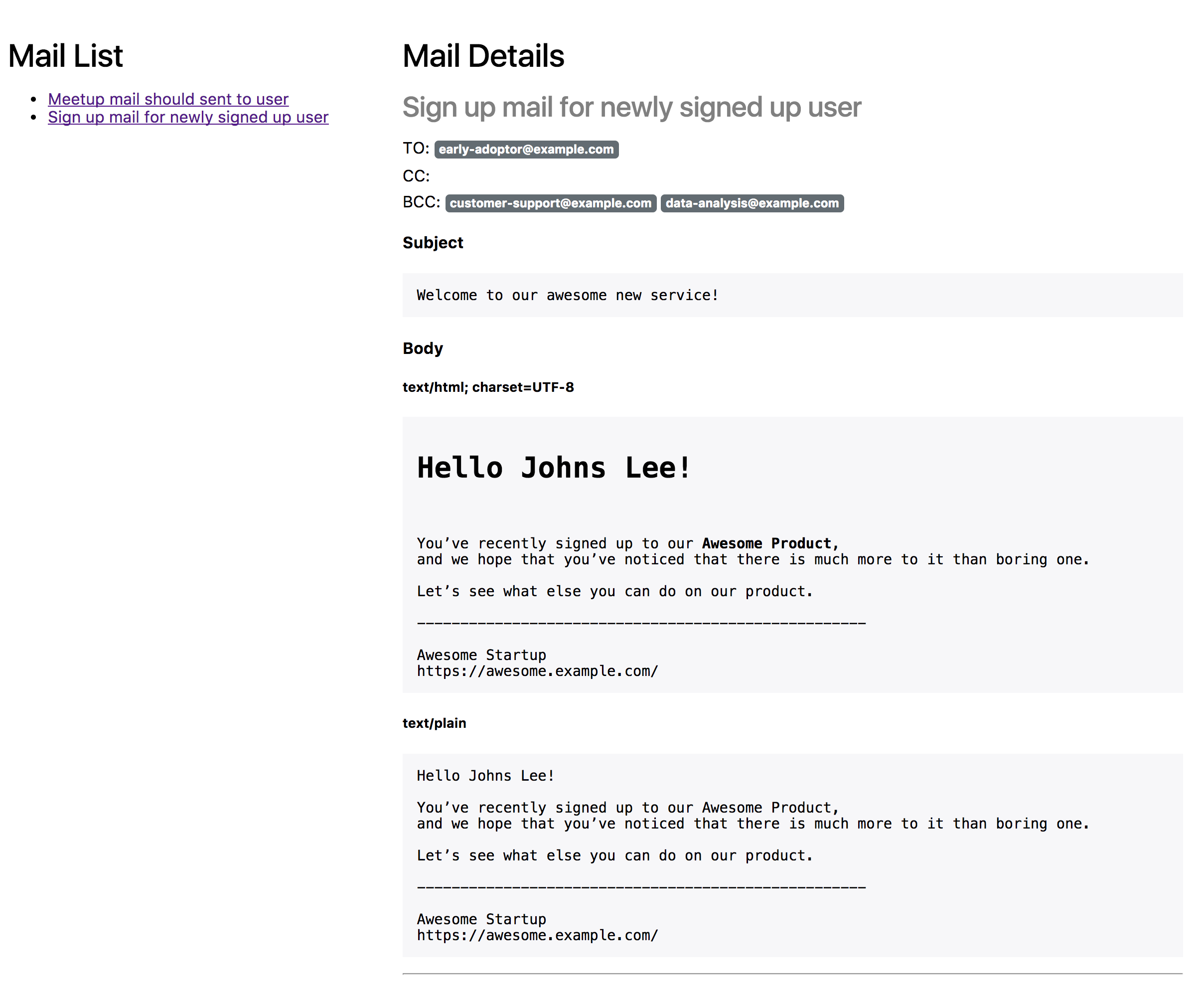Ecosyste.ms: Awesome
An open API service indexing awesome lists of open source software.
https://github.com/ohbarye/automaildoc
📧 Generate email preview from your mail spec
https://github.com/ohbarye/automaildoc
automation documentation gem mail ruby
Last synced: about 1 month ago
JSON representation
📧 Generate email preview from your mail spec
- Host: GitHub
- URL: https://github.com/ohbarye/automaildoc
- Owner: ohbarye
- License: mit
- Created: 2017-09-02T04:19:02.000Z (about 7 years ago)
- Default Branch: master
- Last Pushed: 2018-03-25T13:06:53.000Z (over 6 years ago)
- Last Synced: 2024-04-14T23:13:10.420Z (7 months ago)
- Topics: automation, documentation, gem, mail, ruby
- Language: Ruby
- Homepage: https://rubygems.org/gems/automaildoc
- Size: 28.3 KB
- Stars: 6
- Watchers: 3
- Forks: 0
- Open Issues: 0
-
Metadata Files:
- Readme: README.md
- Changelog: CHANGELOG.md
- License: LICENSE.txt
Awesome Lists containing this project
README
# Automaildoc
[](https://badge.fury.io/rb/automaildoc)
[](https://travis-ci.org/ohbarye/automaildoc)
Automaildoc is a gem to generate a list of about mails from your mail spec.

This gem, idea, design all are completely inspired by the awesome predecessor, https://github.com/r7kamura/autodoc.
## Installation
Add this line to your application's Gemfile:
```ruby
gem 'automaildoc', group: :test
```
And then execute:
```console
$ bundle
```
Or install it yourself as:
```console
$ gem install automaildoc
```
## Usage
1. Add a `automaildoc` tag to your mail spec.
```ruby
RSpec.describe 'Sign up mail', automaildoc: true do
let!(:user) { create(:user) }
let!(:mail) { SignupMailer.mail(user) }
it 'should send to a user' do
expect(mail.to).to eq user
end
end
```
2. Run rspec test with `AUTOMAILDOC`
```console
$ AUTOMAILDOC=1 bundle exec rspec
```
That's it. Then Automaildoc generates an HTML file to `./doc/mails`. The file should be what you've wanted.

### Example
You can see `spec/dummy/doc/toc.html` in this repository, which is auto-generated one from mail specs in `spec/mails`.
### Custom description
You can write descriptions with let(:description).
```ruby
describe 'Sign up mail', automaildoc: true do
let(:description) { 'Sign up mail for newly signed up user' }
# examples follow
end
```
### Configuration
- path - [String] location to put files (default: `./doc/mails`)
- html_template - [String] ERB template for a mail (default: `./automaildoc/templates/mail.html.erb`)
- toc_html_template - [String] ERB template for table of content (default: `./automaildoc/templates/toc.html.erb`)
```ruby
Automaildoc.configuration.path = "doc/mails"
Automaildoc.configuration.html_template = File.read(File.expand_path("../automaildoc/templates/mail.html.erb", __FILE__))
Automaildoc.configuration.toc_html_template = File.read(File.expand_path("../automaildoc/templates/toc.html.erb", __FILE__))
```
## Development
After checking out the repo, run `bin/setup` to install dependencies. Then, run `bundle exec rspec` to run the tests. You can also run `bin/console` for an interactive prompt that will allow you to experiment.
To install this gem onto your local machine, run `bundle exec rake install`. To release a new version, update the version number in `version.rb`, and then run `bundle exec rake release`, which will create a git tag for the version, push git commits and tags, and push the `.gem` file to [rubygems.org](https://rubygems.org).
## Contributing
Bug reports and pull requests are welcome on GitHub at https://github.com/ohbarye/automaildoc. This project is intended to be a safe, welcoming space for collaboration, and contributors are expected to adhere to the [Contributor Covenant](http://contributor-covenant.org) code of conduct.
## License
The gem is available as open source under the terms of the [MIT License](http://opensource.org/licenses/MIT).